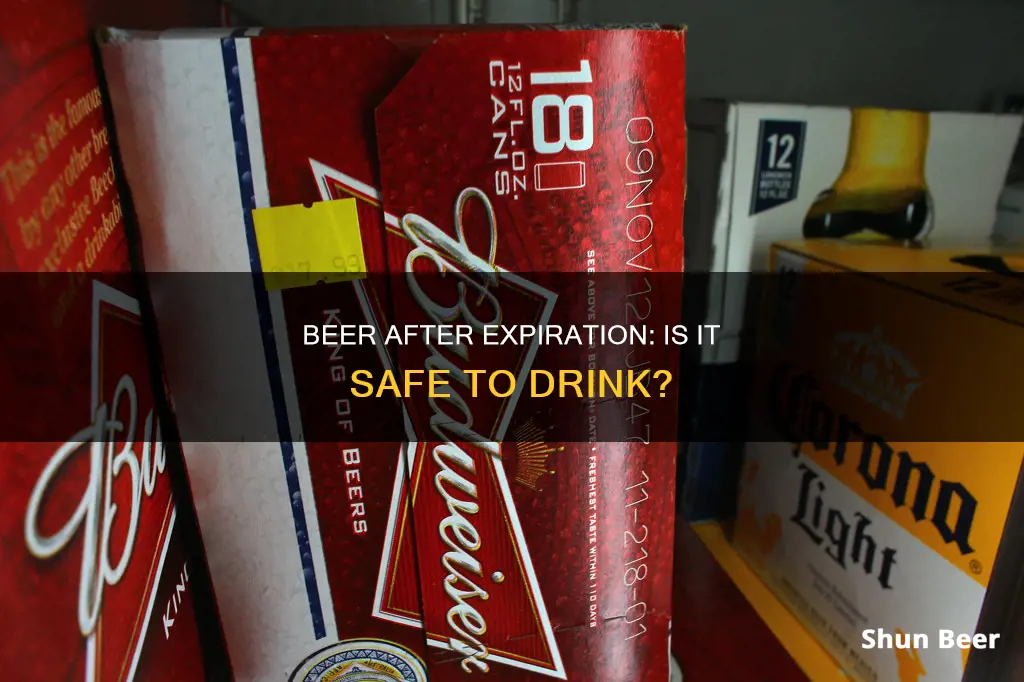
Beer is a beloved beverage for many, but what happens when it goes past its expiration date? Can you still drink it? The short answer is yes—drinking beer that has passed its expiration date is unlikely to make you sick. Beer differs from food in that it doesn't expire in the same way; due to its alcohol and hops content, there is little to no pathogenic growth, and the worst thing that will happen is a change in taste. However, it's important to note that this applies to sealed beer. Once opened, beer should be consumed within a day or two, as oxidation will quickly degrade its flavour.
| Characteristics | Values |
|---|---|
| Is it safe to drink expired beer? | In almost all cases, yes. The fermentation process, low pH level, and alcohol content make beer an unfriendly environment for microorganisms. |
| How long does beer last for? | At room temperature, beer lasts about 5 to 9 months beyond the expiration date. In a refrigerator, beer can last up to an additional two or three years. |
| How can you tell if a beer has gone bad? | Bad aroma, missing the usual hissing sound and foaming when opened, excessive sediment at the bottom of the bottle, and a vinegary taste. |
| How to store beer so it doesn't go bad? | Keep it in a cool, dark place, preferably the refrigerator. Store it upright to minimise oxidation. |
What You'll Learn

Beer expiration dates and safety
Beer is a beloved beverage for many, but what happens when it goes past its expiration date? Is it still safe to drink?
Beer Expiration
Beer does indeed expire, and it's important to understand what this means for your drinking experience and safety. Beer expiration dates are typically marked as "best before" dates, indicating a guideline on quality rather than safety. This means that drinking beer past its expiration date won't make you sick, but it might impact the taste and quality.
Factors Affecting Beer Shelf Life
The shelf life of beer varies depending on several factors:
- Beer Type: Stronger beers with higher ABV (8% and above), such as stouts and barley wines, tend to improve with age. On the other hand, IPAs and hoppy beers are best consumed fresh to enjoy their full flavor and aroma.
- Storage Conditions: Proper storage plays a crucial role in preserving the quality of beer. Refrigeration and storage in a cool, dark place, like a basement or cellar, can extend the shelf life significantly. Beer should also be stored upright to minimize oxidation.
- Packaging: The type of packaging can affect how long beer stays fresh. Cans are better at blocking out light and oxygen, followed by brown bottles, while clear or green bottles offer less protection and can lead to faster degradation due to light exposure.
Identifying Expired Beer
How can you tell if your beer has gone bad? Here are some signs to look out for:
- Lack of Carbonation: When you open the bottle or can, listen for the signature hissing sound. If it's missing, it could indicate that the beer has lost its carbonation.
- Absence of Foam: Fresh beer often produces white foam when opened. If you don't see this, it may have gone flat.
- Dust on the Bottle: A dusty bottle label is a good indication that the beer has been sitting on the shelf for a while.
- Sediment in the Bottle: Checking for sediment at the bottom of the bottle can be a helpful indicator, although some beer styles like German Weissbier and Belgian Dubbel have yeast sediments that are not considered a flaw.
- Leakage: Leakage around the sealed mouth of the bottle may suggest that the beer has been subjected to high temperatures at some point.
- Off Flavors and Aromas: Taking a sip will quickly reveal any unpleasant flavors or skunky aromas, indicating that the beer has expired.
Safety of Drinking Expired Beer
While drinking expired beer may not be dangerous, it's important to note that the taste and quality will likely suffer. Additionally, unpasteurized craft beer should be consumed fresh and close to its expiration date. If you're unsure about the expiration date or the beer has been stored improperly, it's best to err on the side of caution and discard it.
In conclusion, while beer does expire, it doesn't pose a health risk if consumed past its expiration date. However, the taste and quality will gradually deteriorate over time. To ensure the best drinking experience, it's recommended to follow proper storage practices and consume beer as fresh as possible, especially for hop-forward styles like IPAs.
Beer and the Golo Diet: What You Need to Know
You may want to see also

Beer shelf life and storage
Beer does expire, but it doesn't become unsafe to drink. If you take a sip of expired beer, you'll likely experience unpleasant tastes and aromas. The worst thing that will happen is that you'll have beer that doesn't taste good. The flavour and quality will be degraded, but it's not unsafe to drink. Beer is similar to wine in this respect.
The shelf life of beer varies depending on the type and storage conditions. Most beers are best consumed within 6 to 9 months if stored at room temperature. Refrigeration can extend this period to up to 2 years. Unpasteurised or craft beers may have a shorter shelf life.
The type of beer affects its shelf life. Stronger beers, such as stouts, porters, and high-alcohol content beers, tend to last longer than lighter beers like lagers and pilsners. Hoppy beers, like IPAs, are best consumed fresh to enjoy their full flavour and aroma.
Opened beer has a much shorter lifespan than sealed beer. Opened beer will be good for about a day before the oxidation destroys all the good flavours.
Canned beer usually lasts longer than bottled beer as cans don't let any light in, so the oxidation process is much slower. Clear or green bottles can become "skunky" due to light exposure, which affects the taste. Brown bottles offer better protection against UV rays, and this helps to preserve the beer's quality for longer.
To store beer, keep it in a cool, dark place, preferably a refrigerator. If storing at room temperature, make sure the sun can't reach it. Keep the beer standing upright to minimise the exposure to oxygen. Avoid exposing it to direct sunlight, as UV rays can make the beer lose its flavour.
Viking Beer Consumption: How Much Did They Drink?
You may want to see also

Beer types and their expiration
Beer does expire, but it doesn't pose the same health risks as spoiled food. The alcohol content, low pH, and hops in beer prevent pathogenic growth, so drinking expired beer will not make you sick. However, the taste and quality of the beer will deteriorate over time, especially if exposed to unfavourable conditions like high temperatures or sunlight.
Light Beers (e.g., Pilsners, Pale Lagers)
Shelf life: 6 to 12 months unopened. Best consumed within 3 to 6 months for peak flavour.
Dark Beers (e.g., Stouts, Porters)
Shelf life: 1 to 2 years unopened. Can improve with age due to malt-forward flavours.
Hoppy Beers (e.g., IPAs, Pale Ales)
Shelf life: 3 to 6 months unopened for best hop character. Can last up to a year but with diminished hop intensity. Best consumed fresh.
High-ABV Beers (e.g., Barleywines, Imperial Stouts)
Shelf life: Several years. Often improves with age due to high alcohol content.
Sour and Wild Ales
Shelf life: Several years. Flavours continue to evolve.
Ginger Beer
Shelf life: 9 months unopened if stored in a cool place. 4 days once opened if refrigerated.
It is important to note that the above guidelines are for unopened beers. Once a beer is opened, it is best consumed within a day or two, as oxidation will cause the flavours to deteriorate.
Muslims and Alcohol-Free Beer: Is it Allowed?
You may want to see also

Signs of expired beer
Beer typically has a 'best before' date, rather than a 'use by' date. This means that while the beer will start to lose its quality after the stated date, it is still safe to drink. However, there are some signs to look out for that indicate that a beer has expired and gone bad.
Firstly, check the seal of the beer. If the beer has lost its fizz, it is likely that the seal has been broken, and the beer will not taste as it should. Additionally, if a beer that is not meant to be tangy or acidic has a vinegary taste, it is a sign that bacteria have gotten into the beer, and it should be thrown out.
Beers can also go "skunky" and develop an unpleasant taste and aroma if they are exposed to heat or sunlight. This is caused by a chemical reaction when UV light comes into contact with certain hop compounds. To prevent this, beer should be stored in a cool, dark place, preferably in a refrigerator, and upright to minimise exposure to oxygen.
Finally, if you open a beer and notice an excessive amount of sediment at the bottom of the bottle, it could contribute to a poor taste, and the beer should be discarded.
Goa's Beachside Beer Drinking - What's the Deal?
You may want to see also

What to do with expired beer
Drinking expired beer is unlikely to make you sick. The alcohol content, low pH level, and hops in beer prevent pathogenic bacterial growth. However, the taste of the beer will change over time, and it may lose its fizz and develop a vinegary taste.
Cooking and Baking
Beer can be used in a variety of recipes, including:
- Marinades for meat
- Sauces for chicken or pork
- Braising liquid
- Batter for fried foods
- Baking bread
Hair and Skin Care
Using expired beer in hair and skin care routines is said to provide benefits such as:
- Adding volume and shine to hair
- Balancing skin pH levels
- Tightening pores
- Fighting acne breakouts
Household Uses
Expired beer can also be used for various household tasks, such as:
- Cleaning wooden furniture and cast iron cookware
- Removing carpet stains
- Trapping insects
- Fertilizing plants
Secondary Fermenter Beer: Safe to Drink?
You may want to see also
Frequently asked questions
Beer is unlikely to make you sick, even if it's past its expiration date, as long as it's sealed. However, the taste of the beer will change over time, so it's best to drink beer as fresh as possible.
At room temperature, beer lasts about 5 to 9 months beyond the expiration date. In a refrigerator, unopened beer can last up to two or three years. Opened beer has a shelf life of about a day, regardless of whether it's expired.
There are a few signs to look out for. Firstly, check if the beer has lost its carbonation – if there's no "pssst" sound when you open it, it's likely gone flat. Secondly, check for any bad aromas or unusual tastes – expired beer might taste like wet cardboard or be overly sweet. Finally, inspect the bottle for any signs of leakage or excessive sediment at the bottom.







